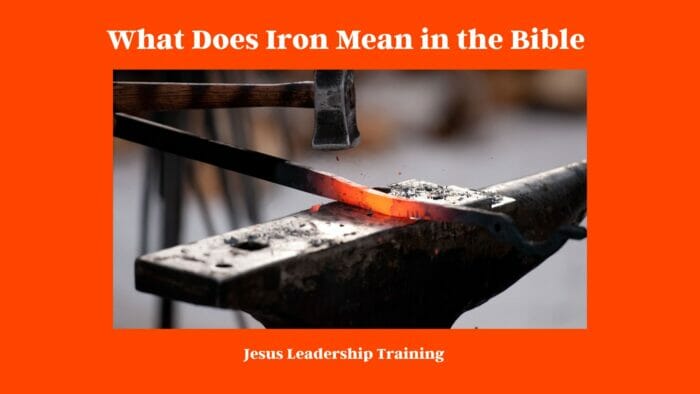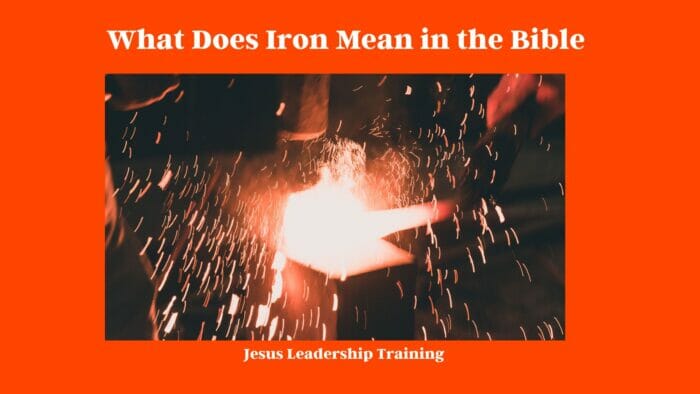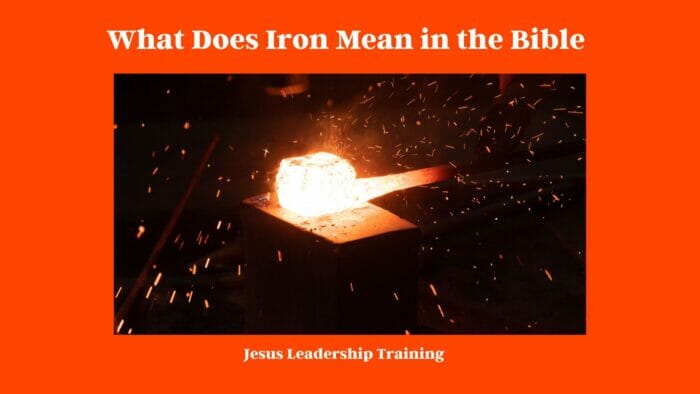What Does Iron Mean in the Bible? Bible interpretations have fascinated scholars, theologians, and everyday readers for centuries. Among its vast array of symbols and metaphors, the use of ‘iron’ stands out for its prominence and depth. So, what does iron mean in the Bible? Let’s dive in and unravel this intriguing topic.
Table of Contents
What Does Iron Mean in the Bible?
Iron in Biblical Times: A Historical Perspective
Tools and Weapons made of Iron in the Bible
Sure, here’s a table that lists instances of tools and weapons made of iron in the Bible:
| Tool/Weapon | Bible Reference | Brief Description |
|---|---|---|
| Iron chariot | Judges 4:3 | Iron chariots were used by the Canaanites under Sisera’s command. These were formidable weapons of war. |
| Iron axe | 2 Kings 6:5-7 | An iron axe was borrowed by a man to cut down a tree, but the axe head fell into the water. Elisha made the iron float so it could be retrieved. |
| Iron bed | Deuteronomy 3:11 | This is more of a tool than a weapon. King Og of Bashan had a bed made of iron. It showed his wealth and power. |
| Iron furnace | Deuteronomy 4:20 | The iron furnace is a metaphor for the hardship and affliction experienced by the Israelites in Egypt. |
| Iron tools | 1 Kings 6:7 | During the construction of Solomon’s temple, iron tools were used. This signifies the technological advancement of the time. |
| Iron pillar | Jeremiah 1:18 | The iron pillar symbolizes strength and steadfastness. Jeremiah was described as an iron pillar standing against the whole land. |
| Iron scepter | Psalm 2:9, Revelation 2:27 | The iron scepter is a symbol of authority and power. In Revelation, it was used to denote the authority given to Jesus over the nations. |
Each of these instances carries a significance, whether in demonstrating the strength and power of adversaries, the miraculous powers of God’s servants, or the technological advancements of the times.

Iron: A Game-Changer in Biblical Times
Just as the Iron Age revolutionized human history, so did the mention of iron in the Bible signify profound changes. The discovery and use of iron dramatically influenced life in biblical times, affecting everything from warfare to agriculture.
Archeological Insights on Iron
Archaeological findings corroborate the extensive use of iron in ancient times. From iron chariots in Canaan to the weaponry of Philistines, this essential metal etched its significance onto the pages of history.
Symbolism and Metaphors of Iron in the Bible
Iron as a Symbol of Strength and Endurance
Does iron in the Bible represent strength? Indeed, the frequent metaphorical usage of iron points towards resilience, power, and durability. For instance, Leviticus 26:19 uses iron to depict the hardness of life under God’s judgment.
Iron in the Hands of Kings and Prophets
Kings and prophets in the Bible are often associated with iron, underlining their might and authority. The symbolism here is profound, revealing the extraordinary impact of these figures in biblical narratives.

Iron in Biblical Parables and Prophecies
Metaphors in the Bible about Iron
Certainly, here is a table that outlines metaphors related to iron in the Bible:
| Metaphor | Bible Reference | Interpretation |
|---|---|---|
| Iron Furnace | Deuteronomy 4:20 | This metaphor describes the harsh conditions of slavery in Egypt from which the Israelites were delivered. It underscores the intense affliction they endured. |
| Iron Scepter | Psalm 2:9, Revelation 2:27 | The iron scepter symbolizes ruling power and authority. This metaphor is used to portray the dominion of God and later the Messiah over the nations. |
| Iron Pillar | Jeremiah 1:18 | This metaphor is used to symbolize strength and steadfastness. God tells Jeremiah that he has made him an “iron pillar” against the people of the land, indicating that he will not be swayed or broken by opposition. |
| Iron Yoke | Deuteronomy 28:48, Jeremiah 28:13-14 | The iron yoke metaphorically represents severe bondage and oppression. In these verses, it is used to describe the heavy burden of Babylonian captivity that the Israelites will suffer for their disobedience to God. |
| Iron Heaven | Leviticus 26:19 | Iron heaven metaphorically represents drought and the absence of rain. It is a part of the curses promised to the Israelites if they disobeyed God’s commandments. The iron heaven is unyielding and gives no rain, leading to famine. |
| Iron Teeth | Daniel 7:19 | The iron teeth in Daniel’s vision are part of the fourth beast, symbolizing the ferocious and devouring nature of the fourth kingdom prophesied to arise. |
These metaphors all use iron to express various ideas and concepts, using its intrinsic properties like strength, durability, and unyielding nature to convey deeper spiritual truths.
Iron in Parables: Drawing Lessons
Parables, rich in symbolism, often include references to iron. These tales impart valuable lessons on morality, faith, and human nature, with iron adding depth to their message.

The Role of Iron in Prophecies
Iron is frequently found in biblical prophecies. Its use adds weight to visions of future events, whether they’re hopeful or ominous. It serves as an impactful metaphor, effectively capturing the essence of the prophecies.
Iron in Everyday Life: Practical References
Iron in the Workforce: Farming and Blacksmithing
The Bible’s references to iron aren’t purely symbolic—they also reflect everyday life. Iron tools revolutionized farming and blacksmithing, shaping societies in a concrete way.
While the Bible does not provide a detailed step-by-step account of iron formation or ironworking techniques as we understand them today, it does make several references to iron and iron tools. Below is a table that reflects this:
| Step | Bible Reference | Description |
|---|---|---|
| Mining | Job 28:2 | The Bible acknowledges the process of mining where iron is taken out of the earth. This indicates that iron ore was extracted from the earth. |
| Melting/Smelting | Proverbs 17:3, 27:21 | Proverbs speaks metaphorically of a furnace for gold and a crucible for silver, indicating a knowledge of the smelting process for metals. Though iron is not explicitly mentioned, it is reasonable to assume similar processes would have been applied to iron ore to extract the metal. |
| Forging | Isaiah 54:16 | The prophet Isaiah mentions the blacksmith who uses the forge to work on iron, indicating the use of high heat to shape and mould the iron into the desired form. |
| Crafting | Deuteronomy 27:5, 1 Kings 6:7 | These verses refer to the use of iron tools for carving and construction. In Deuteronomy, the Israelites are commanded to build an altar of stones not shaped by iron tools. In Kings, the stones for Solomon’s temple are prepared at the quarry, so no sounds of iron tools are heard at the construction site. This indicates a sophisticated level of craftsmanship and the importance of iron tools in these processes. |
| Sharpening | Proverbs 27:17 | Iron sharpening iron is used metaphorically to illustrate the benefits of fellowship and mutual encouragement. It also suggests a knowledge of how iron tools would be maintained and kept sharp for use. |
Please note that the exact methods and techniques used in ironworking during biblical times are not described in the Bible and our understanding comes from archaeological discoveries and historical research.
Iron Objects and Architecture
Iron’s role extends to biblical structures and objects, reflecting its importance in practical, daily life. From city gates to utensils, the omnipresence of iron is unmistakable.
Interpreting ‘Iron’ in Different Bible Versions
Iron in the King James Version
The King James Version uses the term ‘iron’ in a variety of contexts, contributing to our understanding of its meaning. These varied instances provide a comprehensive picture of iron’s significance.
Iron in Other Bible Translations
How do other Bible translations interpret ‘iron’? A comparative analysis of different translations can further enlighten our understanding of what iron means in the Bible.
The Bible is the most influential spiritual and historical text in the world. It has been studied and interpreted for centuries, with its stories and parables providing insight into the divine and its power. One of the most commonly used symbols in the Bible is that of iron. Iron has been used in the Bible since ancient times, and its references and symbolism can be found throughout the text. This article will examine the biblical significance of iron, how it is used in the Hebrew Bible, and the spiritual and symbolic meanings of this powerful metal.
Examining the Biblical Significance of Iron
Iron is referenced throughout the Bible, often in the context of weapons, tools, and other objects of strength. It is mentioned in both the Old and New Testaments, often as a sign of strength and power. In the book of Numbers, iron is used to symbolize the strength of God’s chosen people, the Israelites. In the book of Isaiah, iron is used to symbolize the strength and power of God’s enemies. In the book of Ezekiel, iron is used to symbolize the strength of God’s divine judgment.
Iron is also used in the Bible to symbolize strength and protection. In the book of Proverbs, iron is used to symbolize a strong shield that protects us from harm. In the book of Psalms, iron is used to symbolize a mighty fortress that guards us from our enemies. In the book of Jeremiah, iron is used to symbolize a wall of protection that defends us from danger.
How Iron is Used in the Hebrew Bible
In the Hebrew Bible, iron is used in a variety of contexts. In the book of Genesis, iron is used to symbolize the strength and power of God. In the book of Exodus, iron is used to symbolize the strength of the Israelites. In the book of Leviticus, iron is used to symbolize the strength of the Temple. In the book of Deuteronomy, iron is used to symbolize the strength of God’s law.
The Bible does not provide exact dates for the development of iron use. However, we know from archaeological and historical research that iron use and the development of ironworking techniques took place over a broad span of time in the region where the biblical events occurred. Below is a general table that outlines this development, keeping in mind that the Bible doesn’t offer precise dates for these developments:
| Time Period | Description |
|---|---|
| Bronze Age (3000 – 1200 BC) | Although iron was known and sporadically used in this period, it was not the dominant material. Most tools and weapons were still made of bronze. |
| Iron Age I (1200 – 1000 BC) | Transition from Bronze Age to Iron Age occurred during this period. Iron began to replace bronze in the making of tools and weapons, but the techniques were still rudimentary. |
| Iron Age II (1000 – 586 BC) | Iron use became widespread during this time. Ironworking techniques improved, leading to higher quality iron products. The Bible contains numerous references to iron in this period, including the iron chariots of the Canaanites (Judges 1:19), and tools like the axe (2 Kings 6:5). |
| Babylonian Exile and After (586 BC and after) | References to iron continue into the later periods of the Bible, including the time of the Babylonian exile and the post-exilic period. Iron remained a commonly used material for many centuries thereafter. |
Remember, this table should be viewed as an approximation since the Bible does not provide precise dates for these technological advancements.
Exploring the Meaning of Iron in the Bible Dictionary
The Bible Dictionary defines iron as “a symbol of strength, power, and protection.” Iron is also used to symbolize the strength of God’s chosen people, the Israelites. It is also used to symbolize the strength of God’s enemies, the strength of divine judgment, and a wall of protection.
Discovering What Iron Represents in Life
Iron is a strong, hard metal that is used in many different ways. It is used to construct buildings, bridges, and other structures. Iron is also used to make tools such as hammers, saws, and pliers. Iron is also used to make weapons, such as swords and shields. In the Bible, iron is used to symbolize strength, power, and protection.
Unveiling the Spiritual Significance of Iron
In the Bible, iron is often used to symbolize God’s strength and power. Iron is used to symbolize the strength of God’s chosen people, the Israelites. Iron is also used to symbolize the strength of God’s enemies, the strength of divine judgment, and a wall of protection. In the book of Isaiah, iron is used to symbolize the strength and power of God’s enemies. In the book of Ezekiel, iron is used to symbolize the strength of God’s divine judgment.
Gaining Insight on Iron’s Meaning in the Bible
The Bible is full of references to iron and its symbolism. Iron is used to symbolize strength, power, and protection. It is also used to symbolize the strength of God’s chosen people, the Israelites. Iron is also used to symbolize the strength of God’s enemies, the strength of divine judgment, and a wall of protection. Iron is a powerful symbol of strength and protection that can be found throughout the Bible.
What Does Iron Mean in the Bible: Frequently Asked Questions (FAQs)
1. What is the first mention of iron in the Bible?
The first mention of iron is in Genesis 4:22, where Tubal-cain is described as an “instructor of every artificer in brass
and iron.”
2. Why is iron significant in the Bible?
Iron is significant due to its historical relevance, metaphorical richness, and presence in everyday life during biblical times.
3. What does ‘iron sharpeneth iron’ mean?
Proverbs 27:17 says, “Iron sharpeneth iron; so a man sharpeneth the countenance of his friend.” This means that people improve each other through interaction, just as iron sharpens iron.
4. How does iron symbolize strength in the Bible?
Iron is a symbol of strength, resilience, and endurance due to its durability and essential role in warfare and construction.
5. Is the ‘iron rod’ mentioned in the Bible?
Yes, the ‘iron rod’ is mentioned in Psalms and Revelation. It typically symbolizes strong, authoritative rule or guidance.
6. How is iron used in biblical prophecies?
In biblical prophecies, iron often signifies strength, judgment, or domination. For instance, in Daniel’s vision, the iron legs of the statue symbolize a strong, oppressive kingdom.
Final Thoughts – What Does Iron Mean in the Bible
Understanding the symbolism of iron in the Bible adds a new layer of depth to biblical interpretations. From historical relevance to metaphorical richness, and from everyday use to prophetic visions, the presence of iron in the Bible underscores the holistic nature of this fascinating book. Next time you come across a reference to iron in your biblical studies, take a moment to appreciate the layers of meaning it might hold.






